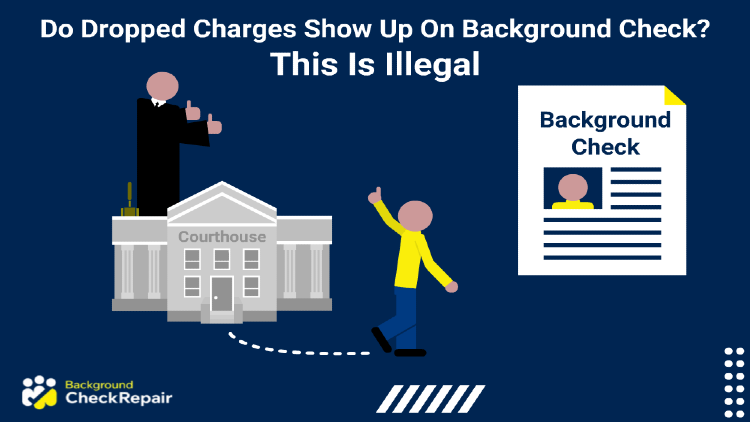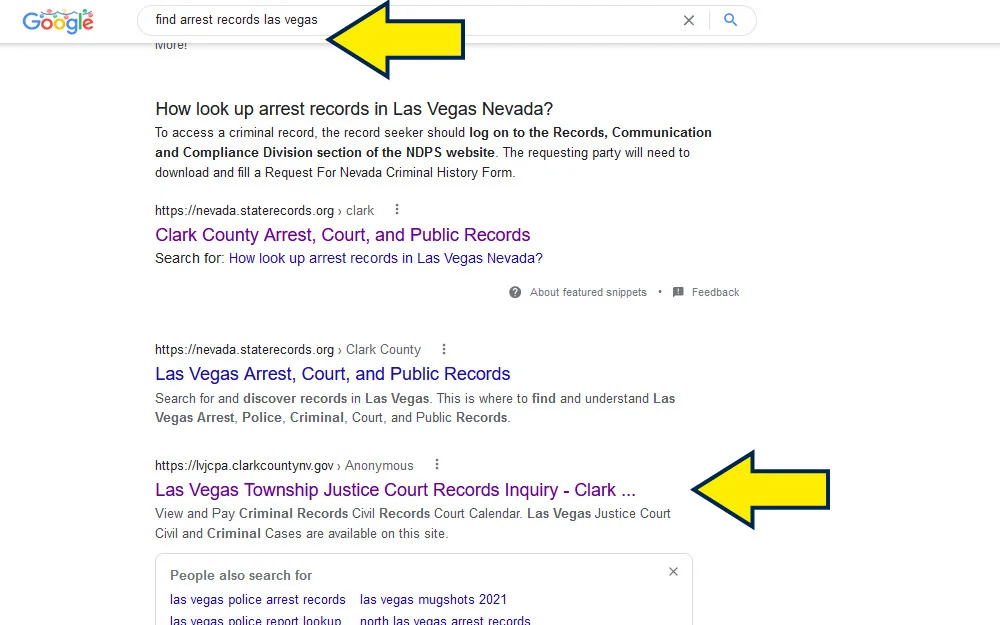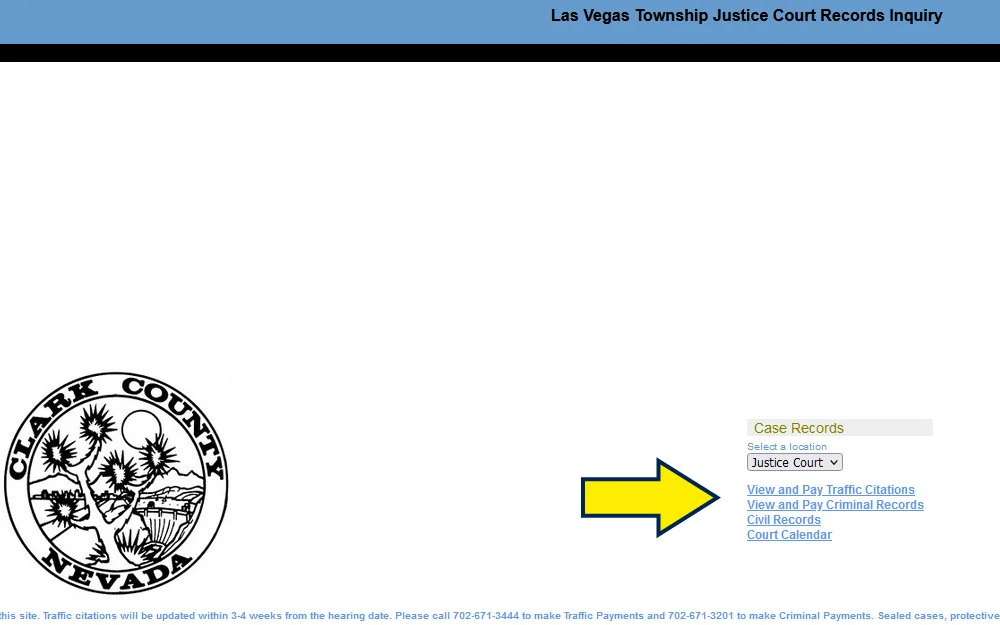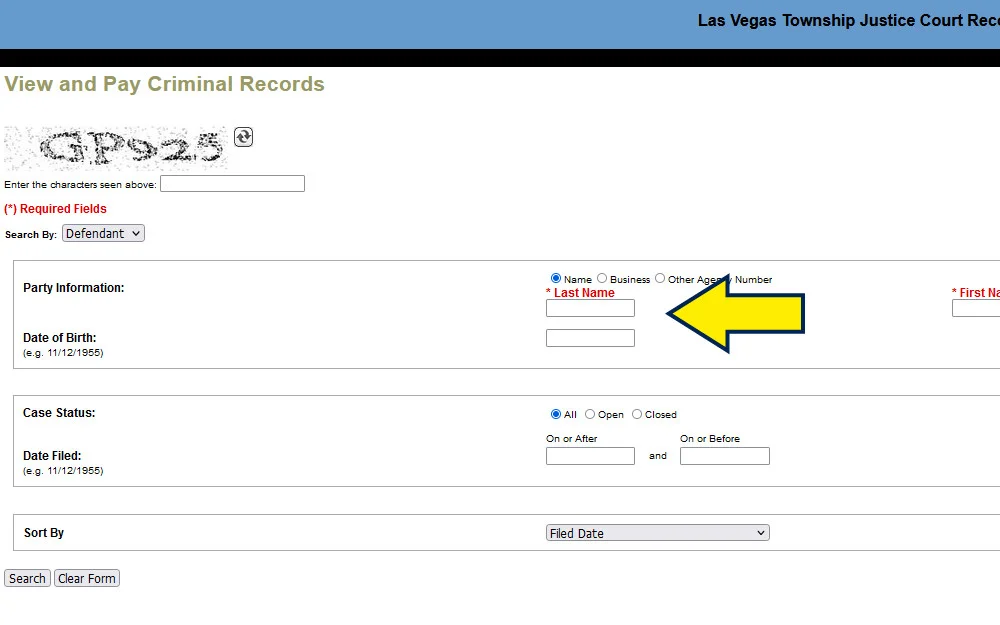We use cookies to ensure that we give you the best experience on our website. If you continue to use this site we will assume that you are happy with it
Do Dropped Charges Show Up on a Background Check? This Is Illegal
 Written by Background Check Repair
Written by Background Check Repair
Background Checks | May 8, 2024

Table of Contents
Since background check requirements and laws vary by state, knowing the answer to “Do dropped charges show up on background check records?” can be a bit tricky. But, there are times when it is illegal for certain information to show up on a criminal history search.
Understanding what criminal charges will show up on a background check, as well as where and when, can become confusing, even in states where some activity including misdemeanors, dropped, and dismissed charges that appear on a background investigation aren’t allowed to be used as considerations of employment.
Some states make it illegal for employers to consider arrest charges that weren’t followed with convictions on employment history searches. However, this doesn’t mean that the information won’t actually appear on a background check… it just means that a company can’t penalize an applicant.
Since charges and arrests do not prove guilt, this protection provides a way for states to ensure that individual’s constitutional rights aren’t violated. And, there’s one sure-fire way that anyone can know for sure, do dropped charges show up on background check reports… perform a background check on yourself first.
Simply put, the first step should be running a personal background check to know exactly what others will see.
Which States Allow Employers To Use Arrest Records Without Convictions?
The following chart is a quick-reference guide outlining which states allow or prevent employers from considering arrest records and criminal charges that did not result in a conviction, but appear on background check records.
Remember, not all background check results will include dropped charges. It will depend on how comprehensive the search is performed.
Since a dropped charge falls under the title of arrest, the following table offers a quick guide for checking whether police reports pop up on background checks and the state laws on arrest record availability.3
| State Agency | Laws Concerning Arrests and Dropped Charges on Background Checks |
| Alabama Law Enforcement Agency | If you want to get rid of a conviction that prevents you from getting an occupational license you can apply to the court for an “Order for Limited Relief.” There are no ban the box laws for private employers conducting background checks. |
| Alaska Department of Public Safety | Occupational licensing parties cannot consider pardoned convictions, although they may consider the underlying conduct. There are no ban the box laws for private employers conducting background checks. |
| Arizona Department of Public Safety | Public employers can disqualify an applicant because of a conviction only if it “has a reasonable relationship” to the function of the job that will be performed. Occupational licensing bodies cannot consider non-violent misdemeanor convictions, records that don’t end up in conviction, or less serious felonies. There are no ban the box laws for private employers conducting background checks. |
| Arkansas Department of Public Safety | Occupational licensing bodies cannot consider non-conviction records, misdemeanors, except if they were sex offenses, and convictions that are pardoned or expunged. A waiver is available for even the most serious crimes for licensing. There are no ban the box laws for private employers conducting background checks. |
| State of California Department of Justice | Pre-employment inquiries into a person’s criminal background can only happen for public employers after a conditional offer or employment. Even after employment, employers cannot consider non-convictions, or convictions that are dismissed or pardoned. This state does have ban the box laws. |
| Colorado Integrated Criminal Justice System | Occupational licensing bodies cannot consider criminal activity that is not directly related to the license being issued, and determined by the same standards as public employees. These bodies cannot deny a license based on non-conviction records, convictions that are pardoned, sealed, or expunged, or those subject to a collateral order of relief. This state does have ban the box laws. |
| Connecticut Judicial Branch Law Libraries | Occupational licensing bodies cannot consider criminal activity that can disqualify someone based on a prior conviction and must consider information related to rehabilitation and elapsed time since the crime was committed. An employer can only ask about an applicant’s criminal background if they are “qualified” for a position, and private employers cannot ask about a criminal background on an initial application. Non-convicted crimes or erased or expunged records may also not be used to determine employment. This state does have ban the box laws. |
| State of Delaware Courts Judicial Case Database | Occupational licensing bodies cannot consider criminal activity that can disqualify someone unless a criminal record will prevent them from performing a job-related necessity. A license can only be denied or revoked for a conviction. Public employers must offer conditional employment before asking about criminal background history. There are no ban the box laws for private employers conducting background checks. |
| District of Columbia Courts | A public employer that has more than ten employees cannot inquire about an applicant’s criminal history until a conditional offer of employment is made. No employer can ask about pending arrests or charges that don’t result in a conviction. There are no ban the box laws for private employers conducting background checks. |
| Florida Department of Law Enforcement | Employers can limit employment based on any information they find in a criminal background check. There are no ban the box laws for private employers conducting background checks. |
| Judicial Council of Georgia | Public employers can ask about criminal records when they apply for employment. Private employers have no restrictions. There are no ban the box laws for private employers conducting background checks. |
| Hawaii Criminal Justice Data Center | Both public and private employers cannot ask about criminal history until a conditional offer of employment is made. Non-conviction records can’t be used to determine employment. This state does have ban the box laws. |
| Idaho Courts Portal | Idaho currently has no laws governing public or private inquiries for background checks related to employment. There are no ban the box laws for private employers conducting background checks. |
| Illinois Bureau of Investigation | Non-conviction, juvenile, or expunged records can’t be used to determine employment. This state does have ban the box laws. |
| Indiana State Licensing Agency | There is little protection for individuals for expunged or dismissed records. There are no ban the box laws for private employers conducting background checks. |
| Iowa Department of Public Safety | Iowa currently has no laws governing public or private inquiries for background checks related to employment. There are no ban the box laws for private employers conducting background checks. |
| Kansas Bureau of Investigation | Employers must notify employees if they plan to conduct a background check. If they don’t it is a misdemeanor offense. Executive branch employers cannot ask about criminal history at the application stage, but there are no laws guiding action thereafter. There are no laws that restrict private employers or non-executive branch public agencies from running background checks. There are no ban the box laws for private employers conducting background checks. |
| Kentucky Court of Justice | A conditional offer of employment must be given before running a background check on an individual. Non-conviction records can’t be used to determine employment. There are no ban the box laws for private employers conducting background checks. |
| Louisiana State Police | Non-conviction records can’t be used to determine employment. There are no ban the box laws for private employers conducting background checks. |
| Maine State Bureau of Identification | Non-conviction records can’t be used to determine employment. There are no ban the box laws for private employers conducting background checks. |
| Maryland Department of Public Safety and Correctional Services Search Search | Public and private employers with more than 15 employees cannot ask about criminal background until there is an interview. Non-conviction records can’t be used to determine employment. There are no ban the box laws for private employers conducting background checks. |
| Massachusetts Criminal Record Check Service | There are no directives preventing employers from using non-conviction criminal background history in employment decisions. This state does have ban the box laws. |
| Michigan State Police | Non-convictions cannot be used to determine employment. There are no ban the box laws for private employers conducting background checks. |
| Minnesota Department of Human Rights | Non-conviction records can’t be used to determine employment. This state does have ban the box laws. |
| Mississippi State Department of Health | Criminal records used from a background check must relate to an applicant’s moral character. There are no ban the box laws for private employers conducting background checks. |
| Missouri State Highway Patrol | Private employers may use background checks as they wish. Public employers can only use criminal record information on condition of employment. There are no ban the box laws for private employers conducting background checks. |
| Montana Department of Justice Criminal Background Check Policy | Montana does not regulate consideration of criminal records for public or private employers. There are no ban the box laws for private employers conducting background checks. |
| Nebraska State Patrol | An appeal can be made to prohibit background information from preventing a professional license or employment. There are no ban the box laws for private employers conducting background checks. |
| Nevada State Police | Criminal records must have a direct relationship to the job an applicant is being considered for. There are no ban the box laws for private employers conducting background checks. |
| New Hampshire State Police | Annulled offenses can still be considered by employers. There are no ban the box laws for private employers conducting background checks. |
| New Jersey State Police | Public and private employers with more than 15 employees cannot ask about criminal background until there is an interview. Non-convictions cannot be used to determine employment. This state does have ban the box laws. |
| New Mexico Department of Public Safety | A conviction must relate directly to the applicant’s ability to complete a job to be considered. There are no ban the box laws for private employers conducting background checks. |
| New York Division of Criminal Justice | There must be a “direct relationship” between the conviction and an application’s ability to do a job to be considered. There are no ban the box laws for private employers conducting background checks. |
| North Carolina Judicial Branch | There must be a “direct relationship” between the conviction and an application’s ability to do a job to be considered. There are no ban the box laws for private employers conducting background checks. |
| North Dakota Attorney General | The offense must have a “direct bearing” on the applicant’s ability to conduct job duties to be considered. There are no ban the box laws for private employers conducting background checks. |
| Ohio Attorney General | There must be a “direct relationship” between the conviction and an application’s ability to do a job to be considered. There are no ban the box laws for private employers conducting background checks. |
| Oklahoma State Bureau of Investigation | There must be a “direct relationship” between the conviction and an application’s ability to do a job to be considered. There are no ban the box laws for private employers conducting background checks. |
| Oregon State Police | There must be a “direct relationship” between the conviction and an application’s ability to do a job to be considered. This state does have ban the box laws. |
| Pennsylvania State Police | There must be a “direct relationship” between the conviction and an application’s ability to do a job to be considered. There are no ban the box laws for private employers conducting background checks. |
| Puerto Rico US Department of Justice | Puerto Rico has no laws governing how background checks can be used. There are no ban the box laws for private employers conducting background checks. |
| Rhode Island, Jamestown Government Site | There must be a “substantial relationship” between the conviction and an application’s ability to do a job to be considered. This state does have a ban the box law. |
| South Carolina State Law Enforcement Division | There are no laws limiting how employers can use background checks in South Carolina. There are no ban the box laws for private employers conducting background checks. |
| South Dakota Attorney General | There must be a “substantial relationship” between the conviction and an application’s ability to do a job to be considered. There are no ban the box laws for private employers conducting background checks. |
| Tennessee Bureau of Investigation | Pardon’s cannot be considered. There are no ban the box laws for private employers conducting background checks. |
| Texas department of Public Safety | There must be a “direct relationship” between the conviction and an application’s ability to do a job to be considered. There are no ban the box laws for private employers conducting background checks. |
| Utah Department of Public Safety | Expunged records cannot be used to determine employment, with exceptions. There are no ban the box laws for private employers conducting background checks. |
| Vermont Department of Public Safety | Criminal records must have a direct relationship to the job an applicant is being considered for. This state does have ban the box laws. |
| U.S. Virgin Islands Police Department | Non-conviction or sealed records cannot be considered for employment. There are no ban the box laws for private employers conducting background checks. |
| Virgina State Police | A candidate must be interviewed before they’re asked about their criminal records. There are no ban the box laws for private employers conducting background checks. |
| Washington Department of Social Health & Services | Individuals turned down for a professional license due to a criminal background check can file an appeal. This state does have ban the box laws. |
| West Virginia State Agency Director | Employers cannot consider criminal records for employment. There are no ban the box laws for private employers conducting background checks. |
| Wisconsin Department of Justice | Only criminal records that are “substantially relevant” to an applicant’s job duties can be considered for employment. There are no ban the box laws for private employers conducting background checks. |
| Wyoming Criminal Records Unit | Wyoming does not restrict how private or public employers use criminal checks to hire. There are no ban the box laws for private employers conducting background checks. |
Which States Forbid Employers From Considering Arrests Without Convictions on a Background Check?
Some states forbid employers from even asking about criminal convictions on job applications. Currently, thirteen states along with the District of Columbia have “ban the box” laws preventing a check box on applications asking about criminal conviction. These include:
- California
- Connecticut
- Colorado
- Hawaii
- Illinois
- Massachusetts
- Minnesota
- New Jersey
- New Mexico
- Oregon
- Rhode Island
- Vermont
- Washington
Although these states make it illegal for employers to ask about convictions initially, that doesn’t necessarily mean that the dropped charges won’t appear during a ‘pre-employment’ background check or that pending court cases won’t appear on the investigation report. To learn whether dropped charges show up on a background check, applicants should consider conducting their own criminal history search before a potential employer.
How Can I Search Arrest Records?
In order to be sure that dropped charges won’t appear on a background check, applicants can conduct their own arrest records check before an employer, using both state and local court clerk public records options. These are typically found online, but some jurisdictions may still require a physical form.
The process is relatively simple:
Step 1. Look Up a Local Jurisdiction With the Phrase “Find Arrest Records”
This works for both state level and county, and the process can be repeated for the city and/or state police, to complete a more thorough check.

Step 2. Scroll Past the Ads and Look for the “.gov” Website
Many online resources look governmental but are not. The “.gov” domain indicates that the site is an official one.

Step 3. Follow the Steps Outlined on the Site
Most sites will allow users to choose a case number or name (first and last) for the search.

Remember, however, that arrest records and criminal records are not the same. Anyone can search criminal convictions using a background check service, and also by searching the state’s Justice Department website (which can also be used to discover whether a criminal charge has been filed). For searching national criminal records, the FBI’s national databases can be employed, which use fingerprints.
Can Dropped Charges Show Up on Background Checks and History Screening?
There’s good news and bad news for people wondering, “Do dropped charges show up on background check records?”
First the good news. Most employers, landlords, institutions of higher education, or banks looking to qualify you for a loan are searching specifically for convictions. Even if they do see something in the background like dropped charges that occurred in the past seven years, in most cases they can’t use that information to deny a job, credit, or a place to live.
There are a few exceptions in some states where background checks can go back indefinitely, but most criminal activity that shows up within a 7-year window is all that can be used.
However, arrests, charges, warrants, or criminal convictions (and subsequent incarceration) are all reflected on public records. So, even if charges are dropped or dismissed, those charges may still show up on a background check (the same is true for arrests without convictions).
Dropped Charges vs. Dismissed Charges: What’s the Difference?
The difference between dropped charges vs. dismissed charges can influence how they will be judged by a potential employer.
When a prosecutor withdraws charges before going to court, they are considered dropped. This usually happens when there isn’t enough evidence to proceed with a trial. For example, perhaps new evidence was uncovered that proved the individual’s innocence. Or, a new witness provided information that pointed to another culprit. Charges can also be dropped if the prosecutor thinks the existing evidence won’t convince a jury. In either event, dropped charges are done at the prosecutorial level.
The opposite is true if charges are dismissed. Dismissed charges involve the court. When charges are dismissed it means that the defense has presented a case to the judge or jury that there isn’t enough evidence to convict someone. If the judge or jury agrees with the defense, the charges are dismissed, usually along with the case.1
Can an Employer Use Dropped Charges Against Me?
Title VII of the Civil Rights Act as described by the Equal Employment Opportunity Commission (EEOC) states that an employer cannot:
- Differentiate between individuals with similar criminal records because of race, national origin, or another Title VII-characteristic like color, sex, or religion.
- Disadvantage Title VII-protected individuals like Hispanics or African Americans.
- Use criminal records to help them decide accurately if someone is likely to be responsible, safe, or reliable as an employee.2
An employer also can’t use the fact that someone was arrested as proof that he or she engaged in criminal conduct. A warrant, for example, does not equal guilt. An arrest also does not equal guilt, so an arrest can’t be used to take negative action, including denying employment or a promotion.
In most states, an employer cannot use dropped charges against an applicant (refer to the list above). Dismissals, or not-guilty verdicts may still show up on a background check but in almost every state, employers are not legally allowed to ask about these incidents or use them to make their decision.
That means if a person was issued a warrant, arrested, and found not guilty, even if that information shows up in a background check (and it will, unless the case was expunged or sealed), that person can legally and rightfully answer “no” if an employer asks about a previous conviction. This is a fundamental right under the 4th Amendment of the U.S. Constitution.3
Finally, it’s important to keep in mind that an employer can’t run a background check without permission. This means you can review your background check before they do to know exactly what will show up.
Can I Have Dropped Charges Removed From a Criminal History Record Check?
Do dropped charges show up on a background check if the charges have been expunged? No.
Expungement of a criminal record is one way that a person can have dropped charges removed from their criminal history record. This happens most often when charges are never filed, or charges are filed but then dismissed.
An expungement of a charge or case is also possible after:
- A person is acquitted of a crime by the court.
- A person is pardoned.
- An order of innocence is filed.
- A person hasn’t yet been tried for charges and a prosecutor recommends that records be expunged.
- There’s a mistake on the criminal record due to a name mix-up (data entry error) or someone else fraudulently used another person’s name when they were arrested.
There are a few other circumstances that dictate when a record can be erased, but it’s best to check with a criminal defense attorney to know for sure if this is possible for a specific situation.4
Knowing the laws in each U.S. state, as well as when and how the information uncovered in a background check can be used by employers, licensing bodies, lenders, and others who have access to public criminal history will help determine do dropped charges show up on background check results.
References
1If charges are dropped against someone, are they still on record? (2019, November 11). Dec. 10, 2021. ASecureLife.com.Web. <https://www.asecurelife.com/if-charges-are-dropped-against-someone-are-they-still-on-record/>
2Pre-employment inquiries and arrest & conviction. Dec. 9, 2021. (n.d.). U.S. Equal Employment Opportunity Commission. Web. <https://www.eeoc.gov/pre-employment-inquiries-and-arrest-conviction>
3What does the Fourth Amendment mean? Dec. 11, 2021. (n.d.). United States Courts.Web. <https://www.uscourts.gov/about-federal-courts/educational-resources/about-educational-outreach/activity-resources/what-does-0>
4FAQs – Clearing an arrest from your record (Expunction). Dec. 11, 2021. (n.d.). Frontpage | Texas Law Help. <https://texaslawhelp.org/article/faqs-–-clearing-arrest-from-your-record-expunction>
